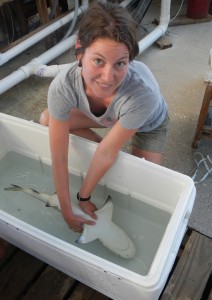Here is a short bio from the Flats intern Melissa:
 I grew up in the countryside of Gatineau, Quebec, Canada where I developed a love for the outdoors and learning about the natural world. I pursued a Bachelor of Science degree in Geography at Carlton University in Ottawa, Ontario, Canada which exposed me to an array of interesting research questions associated with the physical environment. I had the amazing opportunity to be directly involved in research projects, leading to a directed study in dendroarchaeology in which I found the year of origin of heritage log buildings based on the tree-ring sequence sampled from the structure. For my undergraduate thesis, I studied the influence of watershed characteristics and lake chemistry variables on concentrations of mercury in 12 lakes in the Gatineau Park, Quebec, Canada.
I grew up in the countryside of Gatineau, Quebec, Canada where I developed a love for the outdoors and learning about the natural world. I pursued a Bachelor of Science degree in Geography at Carlton University in Ottawa, Ontario, Canada which exposed me to an array of interesting research questions associated with the physical environment. I had the amazing opportunity to be directly involved in research projects, leading to a directed study in dendroarchaeology in which I found the year of origin of heritage log buildings based on the tree-ring sequence sampled from the structure. For my undergraduate thesis, I studied the influence of watershed characteristics and lake chemistry variables on concentrations of mercury in 12 lakes in the Gatineau Park, Quebec, Canada.
I couldn’t get enough of doing field work on lake and stream systems, so in the autumn of 2012 I worked as a field assistant for both the Geography department of Carleton University and the Rideau Valley Conservation Authority, which included catching fish in lakes of the Gatineau Park and taking muscle biopsy samples which were tested for mercury concentrations, and collecting and identifying benthic macroinvertebrates to assess the health of streams. I also worked for the organization The Council of Canadians throughout my undergrad, which developed my passion for social and environmental justice issues and taught me the power that lies in communities and grassroots activism.
While not entirely a landlubber due to my interests in swimming, fishing, windsurfing, and canoeing, I have never lived close to the ocean and my knowledge of marine biology is quite basic. On more or less of a whim, I decided to apply for an internship with the Flats Ecology and Conservation team at the Cape Eleuthera Institute because I wanted to learn more about marine ecology and I admired the way in which CEI and the Island School teach and model the concept of ecological literacy and conservation initiatives through research, education, and outreach. While working with the Flats Ecology and Conservation program, I look forward to learning more about fish physiology and conservation and the role of mangrove creeks in supporting biodiversity and maintaining important ecological functions, and to exploring the unique habitat of nearshore flats.